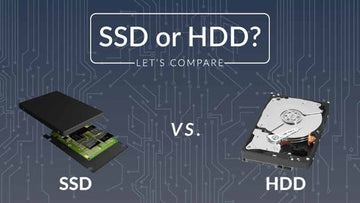
Are you planning to buy a new laptop? If yes, the storage is one of the first things that need your attention. However, we are not talking about just the size — you should pay attention to the type of storage as well. There are two types of storage devices for laptops — Hard Disk Drives (HDDs) and Solid State Drives (SSDs). Choosing between an SSD and an HDD is a common dilemma when considering storage for your computer. It is important that you clearly understand what they are before finalising your decision. In this blog, we have clearly explained both SSD vs. HDD so that you can understand what you need the most.
INDEX
What is an HDD?
Advantages of HDDs:
High Storage Capacity
Affordable Price
Disadvantages of HDDs:
Slower Performance
Fragility
What is an SSD?
Advantages of SSDs:
Speed and Performance
Durability
Energy Efficiency
Silent Operation
Disadvantages of SSDs:
Higher Cost
Limited Capacity Options
Difference Between SSDs and HDDs
Frequently Asked Questions About SSDs and HDDs
1. Can I use both an SSD and HDD in the same computer?
2. How long do SSDs last compared to HDDs?
3. Does using an SSD improve gaming performance?
What is an HDD?
 If you have been using laptops or desktops for a decade or more, you must have used hard disk drives (HDDs). They have been the backbone of computer storage for many years. These drives store data on spinning magnetic disks, known as platters. As the platters rotate, a mechanical arm with read/write heads moves across the surface to access or store information. We understand that it might be a little too technical to understand, so let’s just check out the advantages and disadvantages.
If you have been using laptops or desktops for a decade or more, you must have used hard disk drives (HDDs). They have been the backbone of computer storage for many years. These drives store data on spinning magnetic disks, known as platters. As the platters rotate, a mechanical arm with read/write heads moves across the surface to access or store information. We understand that it might be a little too technical to understand, so let’s just check out the advantages and disadvantages.
Advantages of HDDs:
High Storage Capacity
One of the main reasons many users prefer HDD is because they come with a higher storage capacity. So, if you need a lot of storage, go with an HDD. The highest capacity you get on an HDD is 32TB. It will allow you to store a significant amount of data.
Affordable Price
When it comes to cost per gigabyte, HDDs are still more budget-friendly compared to SSDs. This makes them a popular choice among users who need bulk storage but do not have a high budget. Young video editors and gamers can consider them if they want budget-friendly options.
Disadvantages of HDDs:
Slower Performance
Even though HDDs provide a budget-friendly solution, many people refrain from taking one because of the speed. This is the primary downside of HDDs. Since HDDs rely on physically moving parts to retrieve data, the process takes much longer when accessing or loading data. As a result, tasks like booting up your system or opening programs take time. People might find HDDs very inconvenient when working on resource-intensive tasks or multitasking.
Fragility
HDDs also do not have a very long lifespan. Since they have moving parts, the chances of physical damage are high as well. A fall, bump, or sudden jolt can cause the mechanical parts to malfunction. As a result, you might end up losing crucial data. So, if you are specifically buying a laptop that you will carry when travelling, HDDs might not be the best choice.
What is an SSD?
Although solid state drives (SSDs) were launched in the early 90s, they did not gain popularity in India until recently. Their mechanism has no moving parts and represents a newer generation of storage systems. Instead of using spinning disks, SSDs use flash memory (similar to USB drives) to store data. This is the main difference between SSDs and HDDs.
Advantages of SSDs:
Speed and Performance
Since SSDs do not have physical parts, they can perform tasks much faster than traditional HDDs. They can read and write data almost instantly and reduce waiting time. So, your laptop will boot much faster. You will also be able to share files quicker and eliminate lags when opening large programs. If your current laptop has an HDD and you upgrade to an SSD, you will experience significant improvement.
Durability
The absence of moving parts also eliminates the risk of any physical damage. Even after taking a hard hit, most SSDs can survive and keep your data safe as well. These are durable and will last quite long.
Energy Efficiency
Another advantage of SSDs is their low power consumption. Without the need to power spinning disks, SSDs draw much less energy, making them more energy-efficient. This is particularly beneficial to users who plan to travel with their laptops because the battery will last longer.
Silent Operation
When parts move to store data, they will make sounds. While it may not be a loud noise, it can be a little annoying when working. Thankfully, SSDs do not have moving parts. They do not cause too much noise when operating. These are a better choice if you want a quiet working environment.
Disadvantages of SSDs:
Higher Cost
The higher speed and convenience come at a cost — a higher price. Even though one would argue that their prices have decreased significantly in the last decade, they are still much more expensive than their traditional counterparts.
Limited Capacity Options
While it is true that SSDs cannot compete with HDDs in terms of storage capacity, it is not a concern for most people. Very few users need a storage space higher than 8TB. Therefore, the limited capacity does not create any problems.
Difference Between SSDs and HDDs
|
Aspect |
SSD (Solid State Drive) |
HDD (Hard Disk Drive) |
|
Speed |
Extremely fast data access and transfer speeds. |
Slower due to mechanical parts and physical movement. |
|
Durability |
Very durable and resistant to shocks, as it does not have moving parts. |
More prone to damage from drops and wear over time. |
|
Capacity |
Come with smaller capacities at higher prices comparatively. |
You get larger capacities at more affordable prices. |
|
Energy Use |
Consumes less power and helps in improving the battery life of laptops. |
Higher energy consumption can strain the battery and drain more charge. |
|
Noise |
Completely silent operation due to the absence of moving parts. |
Audible noise from spinning disks and moving heads. |
|
Cost |
More expensive per gigabyte of storage. |
More affordable, especially for large storage needs. |
|
Ideal Use Case |
Best for speed and performance: gaming, professional tasks. |
Best for large data storage: media libraries, backups. |
Also Read: Laptop Cooling Solutions: Keeping Your Device Cool and Efficient
Should You Choose SSD or HDD?
We understand that the decision is tough. However, always remember that your decision depends on how you plan to use your laptop. So, you must think accordingly. Also, always remember that some old laptops may not support SSDs.
If you prioritise speed, an SSD is the clear choice. It will give you faster boot times, quick file access, and a smoother overall experience. You will be able to perform demanding tasks like video editing and gaming much faster. However, it is not budget-friendly. If your priority is finding an economical option, HDD might be the better option. Despite the slow speed, it can store sufficient data and keep it safe. People who are not too keen on the performance speed can choose an HDD.
If you still cannot make up your mind, the ideal option for you would be to choose a laptop with a combination of both SSD and HDD. This setup was introduced with the balanced needs of the users in mind. It brings you the best of both worlds — a fast and affordable storage solution. In the Hybrid system, the SSD holds the operating system and frequently used programs for fast access, while the HDD serves as a bulk storage drive for files that don’t need to be accessed as quickly. There are plenty of laptops with this combination.
As technology continues to evolve, SSDs are becoming more prevalent, and their prices are dropping. However, we understand that they are still not as affordable as HDDs. If you want an SSD but don’t have the budget for it, you can consider buying a refurbished laptop instead of a newer one. At Mobilegoo, there are plenty of refurbished laptops with SSDs at affordable rates. Even though these function just like regular ones, you can buy them at a heavily discounted price from us — up to 80%. Additionally, you get a 7-day replacement policy and up to 1-year warranty. To further reduce the burden on your finances, you can choose No-cost EMI as well. In case you have an old laptop with an HDD, you can sell it on our online platform. It will help to get the best value for your old laptop.
References:
Frequently Asked Questions About SSDs and HDDs
1. Can I use both an SSD and HDD in the same computer?
As mentioned earlier, you can always opt for Hybrid models. These laptops come with both HDDs and SSDs. When you perform essential tasks, the laptop uses the SSD to ensure fast performance. For storing and inessential tasks, the laptop uses the HDD. This will ensure that you can enjoy fast performance at a lower cost.
2. How long do SSDs last compared to HDDs?
Before we begin, we want to clearly state that both options are reliable and the chances of getting damaged suddenly are very low. However, there is still a difference between the lifespan of SSDs and HDDs. SSDs tend to last longer than HDDs because there are no moving parts that will wear and tear over time. Hence, they have a longer lifespan. Irrespective of what you choose, just remember that if you take good care of your laptop, both options will last quite a long time and keep your data protected.
3. Does using an SSD improve gaming performance?
Yes, using an SSD can significantly improve gaming performance. While an SSD won’t boost frame rates directly (since that depends on the graphics card), it can drastically reduce loading times when playing games. Games installed on SSDs load assets much faster. This ensures a smoother and more seamless gameplay experience when playing open-world and resource-intensive games.





